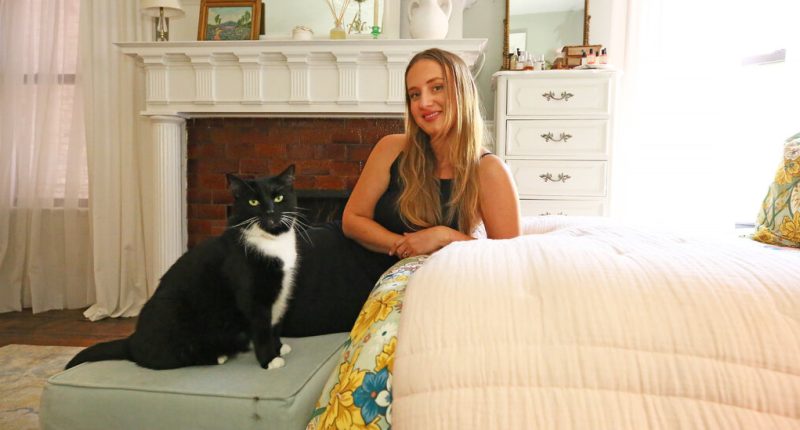
Like many college graduates, Hattie Kolp needed two major things: a job and somewhere to live.
Born and raised in New York, Ms. Kolp always knew she’d be back. California living, she decided after four years attending college outside Los Angeles, wasn’t for her. Her West, she realized, would always be the Upper West Side, where she had lived in the same apartment since she was 10 years old and where the ballet, the opera, art exhibits and Broadway shows were just a few blocks, a train or a cab ride away. Central Park, she likes to say, “was basically my backyard.”
She wanted that spirit again. So with no money and no job, she did what any other 20-something would do: She moved back in with her parents.
She had many fond childhood memories of the two-bedroom, prewar rental. Her parents — her father worked at a nonprofit and her mother as an art historian and, later, a nursery teacher — “loved to throw a good party,” she said. Returning to the “bustling, cramped apartment” was easy.
That was 2014. And Ms. Kolp is still there.
Why? That’s the stuff of New York urban legend — the kind that makes New Yorkers swoon or loathe, the kind that has gained Ms. Kolp some moderate fame, 241,000 followers on TikTok and 230,000 on Instagram.
Her parents’ apartment was rent-stabilized, and when they retired and decamped to Virginia in 2018, they passed the apartment to her.
Ms. Kolp now makes a living as a content creator. Followers are drawn by the dream of living so cheaply in an apartment that Ms. Kolp knows is roomy for one person, but her following has grown as she has explored the intersection of interior design and content creation.
$1,300 (Maybe a little more. Please stop asking her.) | Upper West Side
Hattie Kolp, 31
Occupation: Ms. Kolp is a full-time content creator in the home décor space.
On keeping the apartment in the family: While Ms. Kolp doesn’t have children, she says she intends to hold on to the rent-stabilized apartment for future generations. “I definitely will always keep the apartment, for sure. And if I have children who would like to keep it as well, then, absolutely. I would love that.”
On living on the Upper West Side as an adult: “I’ve never been interested in many of the things that people want to come to New York for. That whole hustle and bustle culture just does not appeal to me. I wanna be as far away from all of that as possible. I don’t wanna be in any trendy areas, I don’t wanna go to a trendy restaurant. I just wanna live my life, so I love that the Upper West Side just is quiet and quaint, and it feels neighborhood-y.”
Content creation is now her job, but it took her a while to get to that place.
After graduating from college, Ms. Kolp took a job showing apartments for a real estate agency, a notoriously brutal and oft-unstable profession in a city like New York. She estimates that she made just $1,000 during the stint. “I never ever had any adult experiences with New York City real estate before, so I just had no concept,” she said in an interview.
She did that for two months and then became a teacher — her degree was in child development — another job that barely paid the bills in New York. Even going back to school at Hunter College to get a graduate degree didn’t shake the feeling that she should be doing something different.
While she was unsure about her career, she was certain that she had figured out her living situation, telling herself she “would be insane to not take over the lease,” as her parents prepared to move from the rent-stabilized unit. In New York City, rent stabilization applies generally to apartments in buildings with at least six units that were built before 1974 or newer buildings that receive tax breaks. A nine-member board approves the percentages by which landlords can legally increase rents for such apartments.
The apartment is approximately 1,200 square feet, and remains in the low four figures in a neighborhood where the average monthly rent tops $4,500.
When her parents left, she began making it her own. She abandoned their “boho” theme, she said, and took her inspiration from the Upper West Side’s European-style architecture. The apartment is now more akin to a flat in Paris. “I think I really let the architecture of the neighborhood and the bones of my apartment — really, just, its aesthetic — steer my design choices.”
She began to write on a blog about her experience, sharing her changes to the apartment in real time. While many Americans hunkered down in their apartments with sourdough starters, copies of “Animal Crossing” and far too much booze, Ms. Kolp was knocking down walls.
People were watching, and then more people were watching. It seemed the whole world knew she paid only $1,300 in rent, so much so that she hates talking about that part. She would not tell The New York Times how much her rent has increased since 2021.
Instead, she focused on the apartment’s evolution: The pink walls that colored her childhood bedroom are gone. Initially converted to a guest room for her parents and friends coming into town, today it’s her own personal library. Bookshelves are filled with knickknacks and books from her childhood. The butler’s pantry (Who can say they have one of those?) was painted in a dark green shade to convey a “very moody space” that resembles the entryway of a speakeasy.
She used sticky tiles to make a backsplash in her kitchen. A quick glance up, and you’ll see her sticky, copper-colored papered ceiling. She has also restored a fireplace, uncovered pocket doors, installed crown molding and replaced doorknobs, making changes, she said, that put the apartment back in its “intended condition.”
In between the D.I.Y. projects, she quit her job as a teacher, becoming a full-time content creator last year. Fans (and haters) follow her apartment updates religiously.
While divulging the intimate details of the place where you sleep, socialize, and cry to the world might seem invasive, Ms. Kolp said doing so has helped her find a global community.
“Opening up my life on social media and sharing what I love with the world,” Ms. Kolp said, “it’s led me to have so many amazing friendships and connections that I otherwise would never have made.”
Source: | This article originally belongs to Nytimes.com









